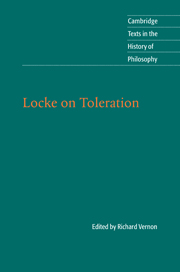Book contents
- Frontmatter
- Contents
- Acknowledgements
- Introduction
- Chronology
- Further reading
- Note on the texts and translation
- Locke on Toleration
- Locke: A Letter concerning Toleration
- Locke: From the Second Treatise (in Two Treatises of Government, 2nd edn, 1698)
- Locke: From An Essay concerning Human Understanding (4th edn, 1700)
- Proast: The Argument of the Letter concerning Toleration, Briefly Considered and Answered (1690)
- Locke: From A Second Letter concerning Toleration (1690)
- Proast: From A Third Letter concerning Toleration in Defence of the Argument of the Letter concerning Toleration, Briefly Considered and Answered (1691)
- Locke: From A Third Letter for Toleration (1692)
- Proast: From A Second Letter to the Author of the Three Letters for Toleration (1704)
- Locke: From A Fourth Letter for Toleration (1704)
- Index
- Titles in the series
Locke: From A Fourth Letter for Toleration (1704)
Published online by Cambridge University Press: 05 June 2012
- Frontmatter
- Contents
- Acknowledgements
- Introduction
- Chronology
- Further reading
- Note on the texts and translation
- Locke on Toleration
- Locke: A Letter concerning Toleration
- Locke: From the Second Treatise (in Two Treatises of Government, 2nd edn, 1698)
- Locke: From An Essay concerning Human Understanding (4th edn, 1700)
- Proast: The Argument of the Letter concerning Toleration, Briefly Considered and Answered (1690)
- Locke: From A Second Letter concerning Toleration (1690)
- Proast: From A Third Letter concerning Toleration in Defence of the Argument of the Letter concerning Toleration, Briefly Considered and Answered (1691)
- Locke: From A Third Letter for Toleration (1692)
- Proast: From A Second Letter to the Author of the Three Letters for Toleration (1704)
- Locke: From A Fourth Letter for Toleration (1704)
- Index
- Titles in the series
Summary
[Y]ou grant that every magistrate, without knowing that his religion is true, is obliged, upon his believing it to be true, to use force to bring men to it; indeed you add, ‘who believes it to be true upon just and sufficient grounds’. So you have got a distinction, and that always sets off a disputant, though many times it is of no use to his argument. For here let me ask you, who must be judge whether the grounds, upon which he believes his religion to be true, be just and sufficient? Must the magistrate himself judge for himself or must you judge for him? A third competitor in this judgement I know not where you will find for your turn.
If every magistrate must judge for himself, whether the grounds upon which he believes his religion to be true are just and sufficient grounds, your limitation of the use of force to such only as believe upon just and sufficient grounds, bating that it is an ornament to your style and learning, might have been spared, since it leaves my inference untouched in the full latitude I have expressed it concerning every magistrate; there not being any one magistrate excluded thereby from an obligation to use force to bring men to his own religion by this your distinction.
- Type
- Chapter
- Information
- Locke on Toleration , pp. 170 - 177Publisher: Cambridge University PressPrint publication year: 2010

